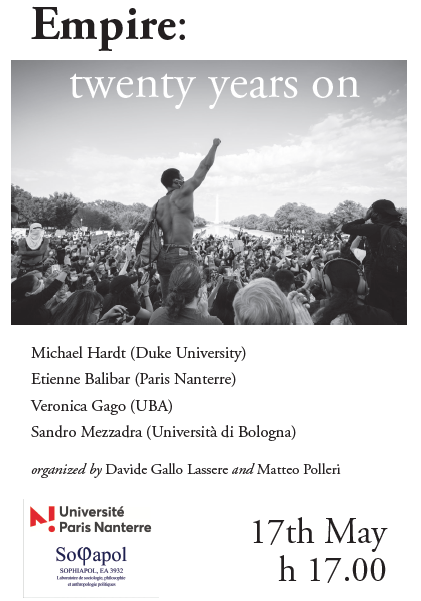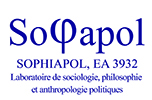Version française / Actualités
- Libellé inconnu,
Empire : 20 years on
Publié le 6 mai 2021
–
Mis à jour le 6 mai 2021

Date(s)
le 17 mai 2021
17h
Written in the second half of the 1990s and published in 2000, Empire became an instant worldwide success. The hypotheses developed by Michael Hardt and Antonio Negri in this book not only had a profound impact on the watchwords and political imaginaries of several social movements of the time, but also constituted a theory of global capitalism and the forms of struggle that run through it. Starting from a discussion of several classical categories of modern and contemporary political thought - such as “empire”, “multitude”, “sovereignty”, “mixed constitution”, “common”, etc. - the authors provide an original analysis of the geo-economic and geo-political transformations that emerged after the collapse of the Soviet bloc, elaborating not only a manifesto of alter-globalization but also an articulate and powerful work of social ontology and political theory. Based on the double hybridization of workerist Marxism with the philosophies of Gilles Deleuze and Michel Foucault, on the one hand, and with feminist and postcolonial studies, on the other, Empire's reflections were subsequently reworked in Multitude (2004), Commowealth (2008) and Assembly (2017), thus giving rise to a rich and controversial debate which has been going on all over the world for the last two decades.
The aim of this meeting is to review the strengths and shortcomings of these theses twenty years after the publication of the book. After the economic crisis of 2008, after numerous cycles of social protest on a global scale, after the authoritarian hardening of neoliberalism, and in the midst of the restructuring of capitalism brought about by the current pandemic, what does Empire teach us? But also, why and how should we read this book in light of the new historical conjuncture? Some ideas were already developed by the authors themselves in an article published shortly before the pandemic in the New Left Review: https://newleftreview.org/issues/ii120/articles/empire-twenty-years-on. We will further elaborate on these questions on Monday 17 May, between 5 and 8 pm (CEST), with:
Debate organised by Davide Gallo Lassere (University of London Institute in Paris) and Matteo Polleri (ENS Pisa – University of Paris Nanterre), with the support of the Sophiapol laboratory (University of Paris Nanterre). To connect to the debate, access the following link:
https://meet.google.com/dsb-yqfv-xzr
Facebook event
Download poster
The aim of this meeting is to review the strengths and shortcomings of these theses twenty years after the publication of the book. After the economic crisis of 2008, after numerous cycles of social protest on a global scale, after the authoritarian hardening of neoliberalism, and in the midst of the restructuring of capitalism brought about by the current pandemic, what does Empire teach us? But also, why and how should we read this book in light of the new historical conjuncture? Some ideas were already developed by the authors themselves in an article published shortly before the pandemic in the New Left Review: https://newleftreview.org/issues/ii120/articles/empire-twenty-years-on. We will further elaborate on these questions on Monday 17 May, between 5 and 8 pm (CEST), with:
- Michael Hardt (Duke University)
- Étienne Balibar (University of Paris Nanterre)
- Veronica Gago (University of Buenos Aires)
- Sandro Mezzadra (University of Bologna)
Debate organised by Davide Gallo Lassere (University of London Institute in Paris) and Matteo Polleri (ENS Pisa – University of Paris Nanterre), with the support of the Sophiapol laboratory (University of Paris Nanterre). To connect to the debate, access the following link:
https://meet.google.com/dsb-yqfv-xzr
Facebook event
Download poster
Mis à jour le 06 mai 2021












